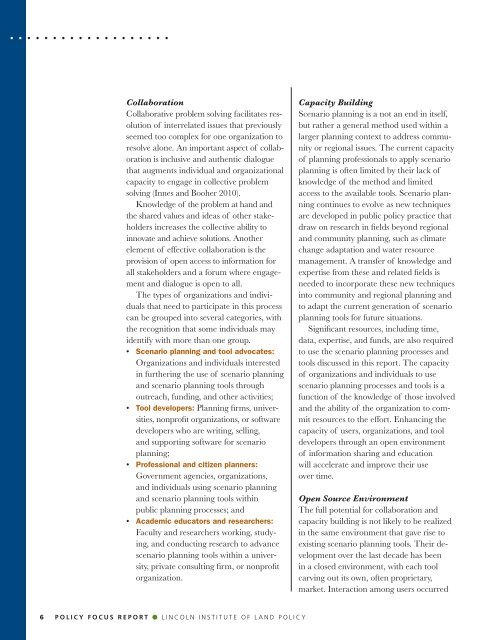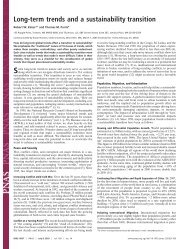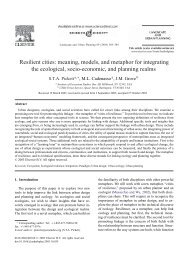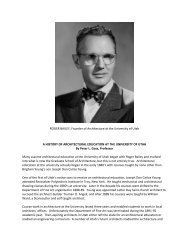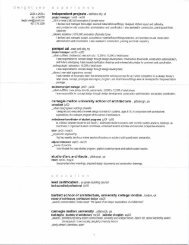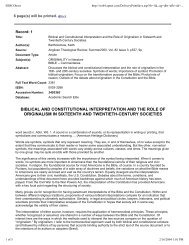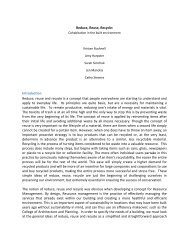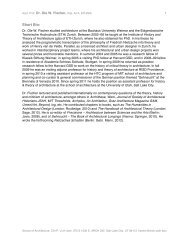Opening Access to Scenario Planning Tools - Knight Foundation ...
Opening Access to Scenario Planning Tools - Knight Foundation ...
Opening Access to Scenario Planning Tools - Knight Foundation ...
You also want an ePaper? Increase the reach of your titles
YUMPU automatically turns print PDFs into web optimized ePapers that Google loves.
. . . . . . . . . . . . . . . . . . .<br />
Collaboration<br />
Collaborative problem solving facilitates resolution<br />
of interrelated issues that previously<br />
seemed <strong>to</strong>o complex for one organization <strong>to</strong><br />
resolve alone. An important aspect of collaboration<br />
is inclusive and authentic dialogue<br />
that augments individual and organizational<br />
capacity <strong>to</strong> engage in collective problem<br />
solving (Innes and Booher 2010).<br />
Knowledge of the problem at hand and<br />
the shared values and ideas of other stakeholders<br />
increases the collective ability <strong>to</strong><br />
innovate and achieve solutions. Another<br />
element of effective collaboration is the<br />
provision of open access <strong>to</strong> information for<br />
all stakeholders and a forum where engagement<br />
and dialogue is open <strong>to</strong> all.<br />
The types of organizations and individuals<br />
that need <strong>to</strong> participate in this process<br />
can be grouped in<strong>to</strong> several categories, with<br />
the recognition that some individuals may<br />
identify with more than one group.<br />
• <strong>Scenario</strong> planning and <strong>to</strong>ol advocates:<br />
Organizations and individuals interested<br />
in furthering the use of scenario planning<br />
and scenario planning <strong>to</strong>ols through<br />
outreach, funding, and other activities;<br />
• Tool developers: <strong>Planning</strong> firms, universities,<br />
nonprofit organizations, or software<br />
developers who are writing, selling,<br />
and supporting software for scenario<br />
planning;<br />
• Professional and citizen planners:<br />
Government agencies, organizations,<br />
and individuals using scenario planning<br />
and scenario planning <strong>to</strong>ols within<br />
public planning processes; and<br />
• Academic educa<strong>to</strong>rs and researchers:<br />
Faculty and researchers working, studying,<br />
and conducting research <strong>to</strong> advance<br />
scenario planning <strong>to</strong>ols within a university,<br />
private consulting firm, or nonprofit<br />
organization.<br />
Capacity Building<br />
<strong>Scenario</strong> planning is a not an end in itself,<br />
but rather a general method used within a<br />
larger planning context <strong>to</strong> address community<br />
or regional issues. The current capacity<br />
of planning professionals <strong>to</strong> apply scenario<br />
planning is often limited by their lack of<br />
knowledge of the method and limited<br />
access <strong>to</strong> the available <strong>to</strong>ols. <strong>Scenario</strong> planning<br />
continues <strong>to</strong> evolve as new techniques<br />
are developed in public policy practice that<br />
draw on research in fields beyond regional<br />
and community planning, such as climate<br />
change adaptation and water resource<br />
management. A transfer of knowledge and<br />
expertise from these and related fields is<br />
needed <strong>to</strong> incorporate these new techniques<br />
in<strong>to</strong> community and regional planning and<br />
<strong>to</strong> adapt the current generation of scenario<br />
planning <strong>to</strong>ols for future situations.<br />
Significant resources, including time,<br />
data, expertise, and funds, are also required<br />
<strong>to</strong> use the scenario planning processes and<br />
<strong>to</strong>ols discussed in this report. The capacity<br />
of organizations and individuals <strong>to</strong> use<br />
scenario planning processes and <strong>to</strong>ols is a<br />
function of the knowledge of those involved<br />
and the ability of the organization <strong>to</strong> commit<br />
resources <strong>to</strong> the effort. Enhancing the<br />
capacity of users, organizations, and <strong>to</strong>ol<br />
developers through an open environment<br />
of information sharing and education<br />
will accelerate and improve their use<br />
over time.<br />
Open Source Environment<br />
The full potential for collaboration and<br />
capacity building is not likely <strong>to</strong> be realized<br />
in the same environment that gave rise <strong>to</strong><br />
existing scenario planning <strong>to</strong>ols. Their development<br />
over the last decade has been<br />
in a closed environment, with each <strong>to</strong>ol<br />
carving out its own, often proprietary,<br />
market. Interaction among users occurred<br />
6 policy focus report Lincoln Institute of Land Policy


